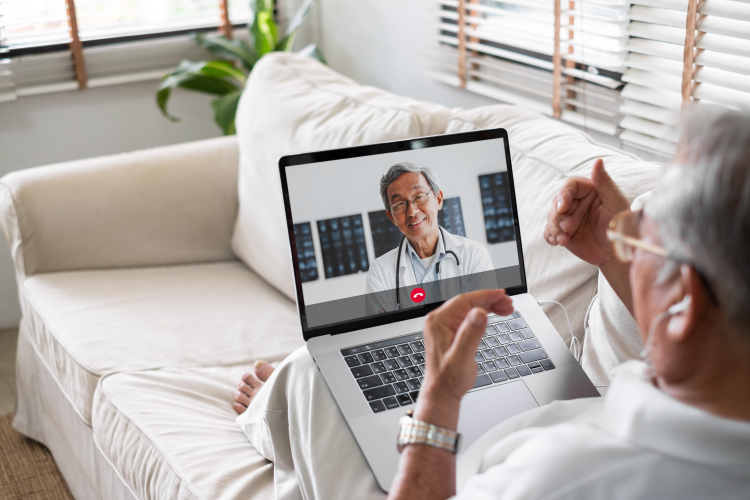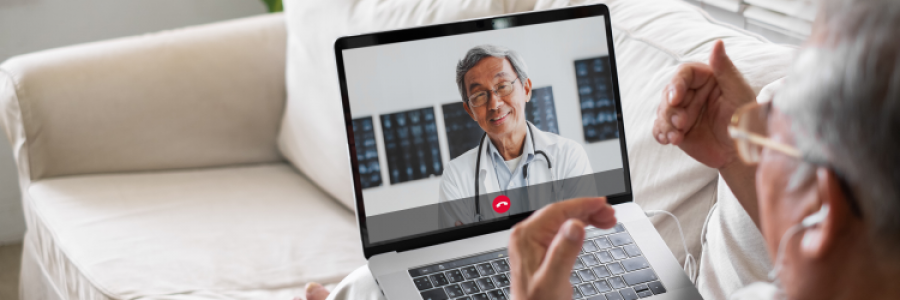Telehealth, also called telemedicine or remote health care, has been around since well before this year. However, its importance has grown in a new way since the beginning of 2020. You may already have had telehealth visits with some of your health providers. Or, you may have heard that it’s an available option for those who can’t or don’t want to go to a doctor’s office. But what is remote health care and how does it work?

Who Will I See if I Use Remote Health Care?
Because it’s still a relatively new field, we still use a lot of different terms for this kind of care. Telehealth or telemedicine are the words often used by doctors themselves. Colloquially you will likely hear friends or family mention a remote doctor, remote health, or virtual checkups. All of these words mean the same thing: care from a doctor that happens via the computer or phone.
Some remote doctors visits happen via programs like Zoom. However, most hospitals and doctor groups prefer to use specialized healthcare apps or websites. In many cases, the exact same doctors, physician assistants, and nurse practitioners are seeing patients both in-person and online.
In places where COVID-19 has shut down or limited “non-essential” health care appointments, remote health is becoming increasingly popular. While it doesn’t come with all the traditional trappings of a regular doctor visit, telemedicine can provide much of the same care for routine health support.
Is Remote Health Safe and Effective?
For routine checkups and simple problems like colds or sore throats, remote health care is a safe and effective option. A regular check-in chat with your doctor may even be easier and faster than an in-person visit. Some practices even provide at-home equipment like blood pressure monitors that connect digitally to your doctor’s office via the Internet.
For emergency care or any treatment that requires a hands-on examination, in-person visits are a better choice. However, for simple things, online care is an equally good option and may be both safer and more convenient than visiting the doctor in-person if you live in a high-risk area. This is especially true for high-risk groups like the elderly or those with pre-existing conditions
Is My Privacy Protected With Remote Health Care?
Telehealth providers must meet strict security requirements. HIPAA privacy laws and regulations apply to online doctors just like other health providers. The special apps that they use are designed to keep your privacy secured as well. From the perspective of your doctor, remote visits are just as carefully private and confidential as in-person visits are.
To make sure that your personal health information stays secure, there are some simple measures you can take to protect your own medical privacy as well:
- Always use a secure internet connection (not public Wi-Fi)
- Call your doctor from a private, enclosed area rather than a common space
- Do not share your login information with anyone at any time
Is Remote Health Care Covered By Insurance?
During the COVID-19 pandemic, many health insurance companies have temporarily expanded their coverage to include remote visits. This means that even if your insurance didn’t cover remote care before, it might be covered now.
There are also remote health care options that charge a flat fee for those who don’t carry health insurance. These visits often cost less than the same kind of care in-person.
What Kind of Equipment Do I Need to Use Remote Health?
If you have a computer, tablet, or smartphone, you should be able to see your doctor virtually. Because each doctor and hospital may prefer a different program, the specific details will vary.
If you are using a desktop computer or an older model laptop computer, make sure that you have access to a webcam. These cameras are typically built into newer laptops and tablets. If you have already been able to video call with friends or family, you have the equipment you need to use remote health.
Looking for information about senior assisted living in Texas? Click here to set up a conversation with one of our senior care experts or schedule a virtual tour.


